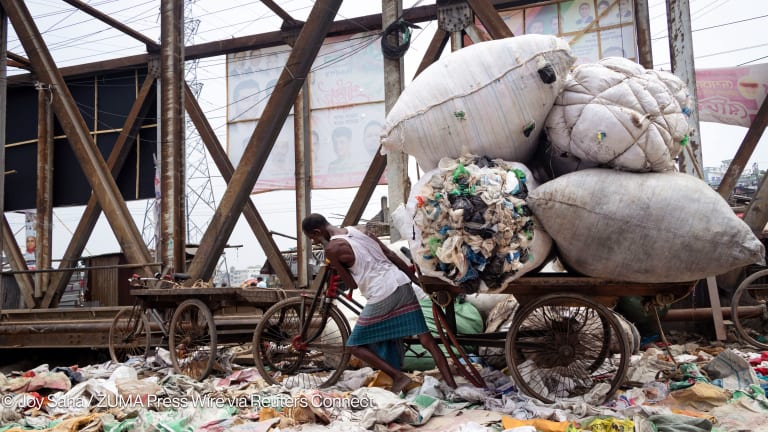
Since the first Rio conference on sustainable development 20 years ago, the world population has become majority urban.
Cities are the 21st century site of global economic growth and job opportunities, and where billions of people will seek to improve their quality of life. In the next 35 years, the fastest rates of urban growth will be in Asia and Africa, where populations are not yet majority urban. At the same time, mature economies will need to renew their infrastructure to meet ever-changing environmental and economic opportunities and challenges.
The ongoing lassitude of the international community in reaching a global agreement on curbing carbon emissions impedes progress towards sustainable development. Without hard carbon reduction targets, global carbon emissions have outpaced most projections. Yet binding mutual commitments to establish such targets, with accountability for results within specific time periods, continues to evade the major emitters. This raises the specter of doubt for the international process.
The slow pace of progress cries out for an alternative international policy framework under which governments could collaborate on goals that advance sustainability.
Given the slowness of national action, their sub-national governments and institutions are forging ahead. Municipal leaders, who must provide public services to growing populations, are developing long-term sustainability plans as part of their economic development strategies. Green growth - where economic growth is tied to sustainability benchmarks - is a pillar for many sub-national regions and in cities. Agglomeration benefits in urban areas stimulate innovation and entrepreneurship in spite of many fiscal constraints. City leaders share success stories and develop policy frameworks that allow other cities, sometimes in very different regions under contrasting governance structures, to adopt the most promising practices. However, these sub-national initiatives have received relatively little attention compared to the ongoing negotiations between nations.
As regions and cities continue forge ahead in dealing with the challenges of global urbanization, the international community and national governments can help them achieve their sustainability goals, even in the absence of an international agreement on carbon reduction. Three specific actions are particularly important:
First, help regions and cities decarbonize their urban transportation systems as much as possible. Efficient, integrated transport systems coupled with supportive land use development policies can greatly enhance long-term sustainability. In the near term, emissions from the transport sector will continue to outpace emissions from other sectors, especially in urban areas.
We should coordinate the development of low-carbon transportation systems with policies designed to maximize the use of space. For urban areas that are already developed or are maturing, this means transitioning to fuel- and space-efficient systems through a more holistic approach to mobility that incorporates public transit, walking and biking in the design of transport systems. New cities can avoid energy-intensive patterns of use by integrating land use and transportation planning with economic growth strategies, such as through mixed-use development where residential and a variety of commercial uses are co-located. Fuel-efficient systems such as electric vehicles should only be considered if there is a high level of utility for each vehicle, such as through shared fleets.
Transportation improvements that are strongly linked to environmental outcomes usually provide social and economic co-benefits that are part of the sustainable development agenda. For example, improving infrastructure for non-motorized travel reduces road fatalities, one of the leading causes of preventable deaths according to the World Health Organization. It also mitigates air pollution, thus reducing respiratory disease and health care costs. Sustainable transportation improvements also support economic growth by alleviating congestion, promoting more efficient movement of people per unit of urban space, and ensuring access to markets.
Second, remove barriers from local governments’ ability to structure sustainable development financing schemes. Fiscal constraints will continue to challenge governments at all levels. Project prioritization analysis should expand economic impacts to include social and environmental benefits in order to maximize return on investment. City-specific infrastructure funds, such as the one recently adopted in Chicago, or increasing direct access for cities to international sources of funding, such as through the World Bank, will provide mayors with more options and flexibility to finance critical green infrastructure. Helping more cities access and set up those funds is crucial to the success of sustainable development.
Third, encourage knowledge transfers within and between cities. While formalization of knowledge sharing between cities through coalitions like ICLEI and C40 has accelerated the adoption of sustainable development goals, more can be done. A critical component of knowledge sharing is to increase the liquidity and consistency of urban data so that cities can compare apples to apples and make decisions quickly. Centralized sharing of knowledge will aid in this goal. A second component is to promote transparency of governance. Open engagement between the public and government will reduce friction in start-up and implementation and typically produce better results in the long run.
The world’s attention should focus on what happens on Monday when Rio+20 ends: What are the next steps to make the hopes and goals realities? These priorities form the start of an urban policy toolkit that could bring about an international paradigm shift to achieve sustainable development through the world’s cities - and will demonstrate that governments do, in fact, have the power and will to act for the betterment of the planet and all its inhabitants.
Tell us what you think! Comment below or tweet to @devex with #RioPlusSolutions, and catch up on other Rio+Solutions content here or on Facebook.








